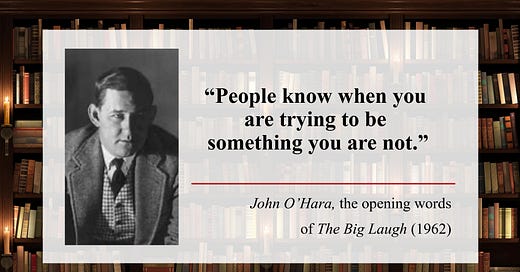Dr. Mardy's Quotes of the Week ("Lying to Oneself")
October 15—21, 2023 | THIS WEEK'S THEME: “Lying to Oneself”
Opening Line of the Week
The opening sentence of The Big Laugh (1962) is direct, succinct, and expressed with all the authority of an axiom about the human experience. In fact, that’s exactly how the narrator viewed it, writing in the second paragraph:
“This law protects some good people who are in danger of turning bad; it also makes it impossible for…
Keep reading with a 7-day free trial
Subscribe to Dr. Mardy's Substack to keep reading this post and get 7 days of free access to the full post archives.



